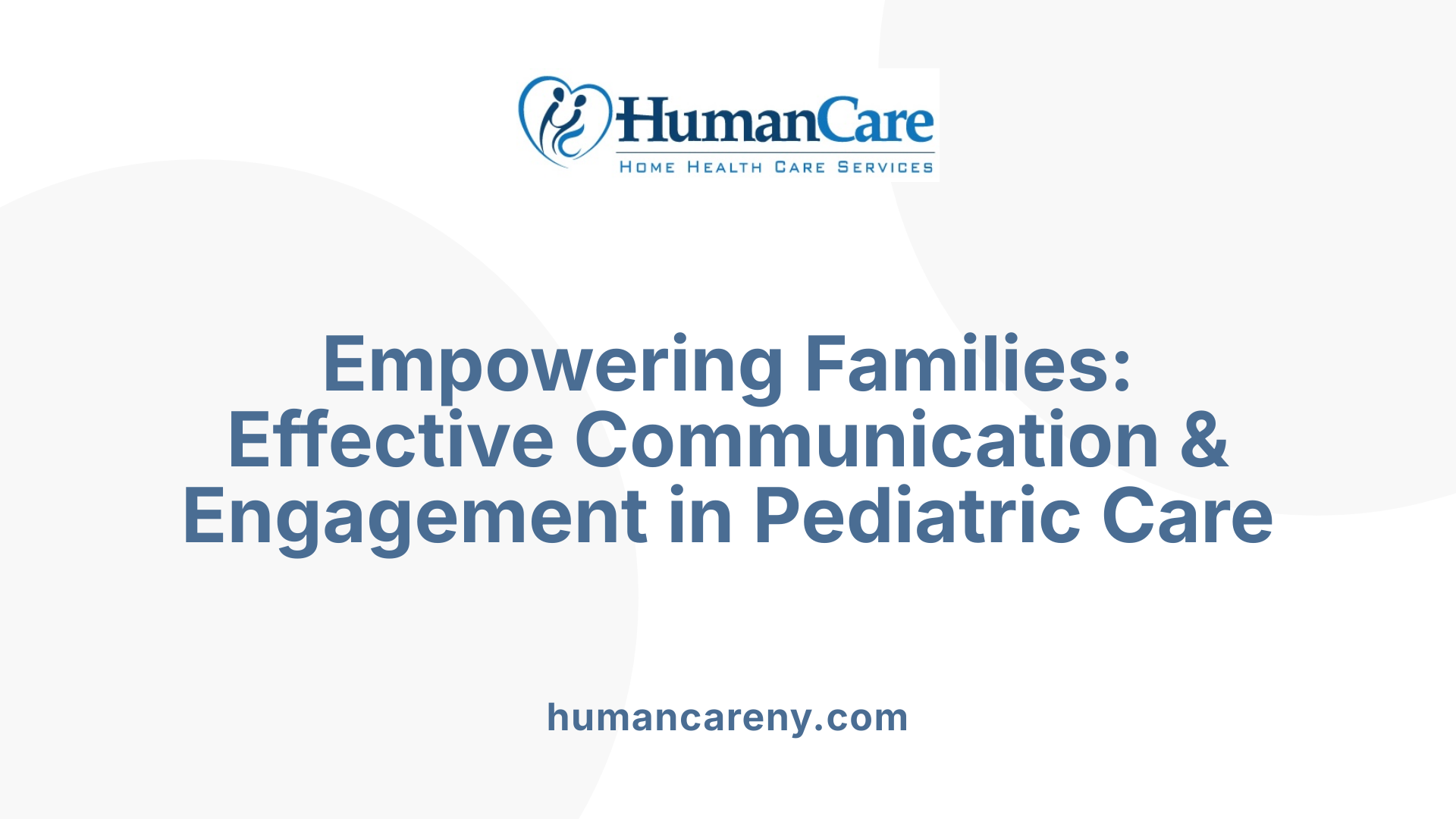Understanding the Emotional Dimensions of Pediatric Home Care
Pediatric home care providers play a crucial role not only in delivering medical treatments but also in fostering emotional and psychological well-being in children with chronic or special needs and their families. This holistic approach to care emphasizes trust, communication, and personalized support, ensuring children remain in a nurturing environment that promotes stability, resilience, and growth.
Building Trust and Emotional Security in Home Care Settings
Why are trust, effective communication, and personalized emotional support important in pediatric home care?
Establishing trust and maintaining effective communication are foundational components in pediatric home caregiving. These elements help foster strong, meaningful relationships between healthcare providers, children, and their families. When families trust their caregivers, they feel more comfortable sharing concerns and participating actively in their child's care, which can lead to better health outcomes and increased emotional stability.
Effective communication ensures that families understand the child's diagnosis, treatment options, and care plans. This clarity reduces confusion and anxiety, empowering caregivers and strengthening their confidence in managing ongoing health needs. It also allows healthcare providers to address concerns promptly and accurately.
Personalized emotional support involves showing empathy and understanding tailored to each child's and family's unique circumstances. This sensitivity helps children feel safe and secure, making it easier for them to cooperate with treatments and therapies. For families, emotional support offers reassurance and comfort during stressful times, fostering resilience and stability.
Together, trust, open communication, and personalized support create a safe, nurturing environment. This environment not only promotes the child's physical health but also enhances their emotional well-being, ensuring a more holistic approach to pediatric care at home.
Facilitating Effective Communication and Caregiver Engagement

How do pediatric home care providers support the emotional well-being of children and their families?
Pediatric home care providers play a crucial role in nurturing the emotional health of both children and their families. They foster trusting, personalized relationships that make families feel supported and understood. By providing compassionate care and reassurance, these professionals help children feel secure and less anxious in familiar surroundings.
Effective communication is a cornerstone of this support. Caregivers ensure they clearly explain medical procedures and care routines, which helps build confidence and reduces fears. Over 86% of caregivers rate their interactions with healthcare providers as good or very good, emphasizing the importance of transparent, respectful dialogue.
Involving families in care decisions is another vital aspect. When caregivers are actively engaged and feel involved—over 85% of caregivers report this involvement—it improves emotional satisfaction and comfort. Regular updates, addressing questions thoroughly, and respecting privacy foster a positive environment that promotes emotional stability.
Education and training are also essential. Caregivers learn skills for managing feeding, trach care, communication methods for non-verbal children, and coping strategies. This empowerment helps families manage stress effectively and enhances their confidence in caring for their child's complex needs.
Supporting mental wellness through personalized, consistent care in the home environment reduces fears related to hospital visits or unfamiliar settings. Ultimately, pediatric home care services promote emotional resilience, strengthen family bonds, and improve overall quality of life during difficult times.
Supporting Family Caregivers Emotionally During Pediatric Care

How do pediatric home care providers assist family caregivers emotionally during pediatric care?
Pediatric home care providers play a crucial role in supporting family caregivers emotionally, especially during long-term care for medically fragile children. They do this by offering compassionate support customized to each family's unique needs. Nurses and other clinicians build trusting relationships with families, providing reassurance in stressful times. This emotional backing helps caregivers feel less isolated and more confident in their roles.
An essential aspect is offering resources, including educational materials and training on caregiving tasks. When caregivers are equipped with knowledge about feeding, trach care, and communication strategies, they gain a sense of empowerment and control. This reduces feelings of helplessness and increases their capacity to manage their child's needs effectively.
Effective communication is also vital. Healthcare providers ensure caregivers are involved in their child's care, feel heard, and receive timely updates. Respectful, clear communication enhances trust and emotional well-being.
Moreover, home care teams provide stability and continuous support, which can alleviate emotional stress and foster resilience in families.
Alleviating caregiver stress and social isolation
Caregiving can be overwhelming and isolating. Pediatric home care nurses help alleviate these feelings through regular, compassionate touchpoints and by creating a supportive environment. They listen to caregivers' concerns, validate their feelings, and offer practical strategies for managing challenging situations.
Supporting mental health, reducing anxiety, and promoting social connection are integral. Some families benefit from connecting with support groups or community resources, which can be facilitated through the home care team.
Empowering caregivers with education and resources
Empowering families through education is a core element of pediatric home care. Caregivers receive guidance on medical procedures, therapy techniques, and coping skills, increasing their confidence.
Educational resources often include instructions on managing feeding challenges, wound care, or communication for non-verbal children. These empower the family to handle daily tasks independently, which can significantly lessen emotional burdens.
The importance of respectful communication and emotional involvement
Respectful, ongoing communication between healthcare providers and families is essential. Over 86% of caregivers rate their communication with providers as good or very good, highlighting how effective dialogue enhances emotional support.
When families are actively involved in care planning and decision-making—reportedly about 85.6% of the time—they feel more supported and less anxious. Involving caregivers fosters trust, satisfaction, and better emotional outcomes.
By prioritizing these elements—empathy, education, involvement, and respectful dialogue—pediatric home care services create a nurturing environment that addresses the emotional needs of families, helping them navigate the complex journey of caring for a medically fragile child.
Addressing the Emotional and Psychological Well-Being of Children with Special Needs
 Creating a supportive environment is fundamental in pediatric home care, especially for children with chronic or special needs. These children often face heightened emotional challenges, and a stable, nurturing setting helps reduce their anxiety and fosters emotional security.
Creating a supportive environment is fundamental in pediatric home care, especially for children with chronic or special needs. These children often face heightened emotional challenges, and a stable, nurturing setting helps reduce their anxiety and fosters emotional security.
In home care, caregivers and healthcare providers work closely with families to develop routines that incorporate play, creativity, and developmentally appropriate activities. These activities are essential not only for physical development but also for supporting mental health, self-expression, and self-esteem.
Incorporating play and creative pursuits allows children to explore, learn, and express themselves in safe settings. These activities promote resilience and help children develop a positive sense of self, which is crucial for their overall well-being.
Pediatric home care providers play a vital role in supporting the emotional and psychological well-being of children with health challenges. They offer personalized, family-centered care tailored to each child's needs. By fostering consistent and reassuring interactions, they help to build trust, reduce fears, and support emotional stability.
These professionals often coordinate with multidisciplinary teams, including mental health specialists, to ensure comprehensive support. They utilize techniques such as counseling, education about coping strategies, and resources for emotional support.
Telehealth services and peer support groups have expanded access to psychological assistance, especially in underserved areas. This integration helps families manage emotional stress, learn new coping skills, and feel less isolated.
Overall, addressing mental health in pediatric home care involves a holistic approach. By combining emotional support, therapeutic activities, caregiver education, and community resources, providers foster resilience, nurture positive self-esteem, and improve the mental health of children with special needs, setting a foundation for healthier development.
Challenges Faced by Providers and Strategies for Resilience
What emotional and psychological challenges do pediatric home care providers face, and how do they cope with these challenges?
Professionals working in pediatric home care often encounter high emotional demands due to the complex and sensitive nature of their work. Caring for children with chronic or life-threatening conditions can lead to feelings of helplessness, grief, and emotional exhaustion.
One significant challenge is burnout, which results from long hours, high workload, and the constant emotional investment required. Compassion fatigue, a specific form of emotional exhaustion, occurs when providers become overwhelmed by the suffering they witness regularly.
These emotional and psychological issues are worsened by systemic problems such as workforce shortages, underfunding, and limited access to ongoing specialized training. The combination of these factors can heighten stress levels and impact providers' mental health.
To manage these challenges, pediatric care providers often turn to peer support networks and supervision to share experiences and gain emotional relief. Continual professional development helps them stay confident and informed. Many also adopt self-care practices like mindfulness, taking regular breaks, and seeking counseling services. However, these strategies may fall short without systemic changes that offer proper compensation, adequate staffing, and comprehensive mental health resources.
Addressing the emotional well-being of pediatric providers is crucial. Improving training programs, ensuring fair compensation, implementing systemic reforms, and establishing strong support networks are vital steps in fostering resilience. These measures help maintain a high standard of care while safeguarding the mental health of those dedicated to caring for our most vulnerable children.
Enhancing the Quality and Effectiveness of Pediatric Home Care through Emotional Support

Why are trust, effective communication, and personalized emotional support important in pediatric home care?
Building trust between families and healthcare providers is fundamental to successful pediatric home care. When caregivers and children feel confident in their providers, they are more likely to communicate openly and participate actively in the care process.
Effective communication goes beyond just exchanging medical information; it involves listening attentively to families’ concerns, answering questions clearly, and providing regular updates. Over 86% of caregivers rate communication with healthcare staff as good or very good, which significantly boosts their satisfaction and emotional well-being.
Personalized emotional support tailors care to each child's unique situation, offering empathy and understanding during stressful times. Caregivers often experience high anxiety levels, especially during emergency department visits, where approximately 28.3% report unmet emotional needs. Addressing these needs through compassionate, individualized support helps reduce stress and fosters resilience.
In pediatric home health settings, trust and good communication contribute to better involvement of families in the care plan, which occurs about 85.6% of the time. When families feel involved and supported emotionally, they are more likely to adhere to treatment plans and experience greater satisfaction.
Ultimately, cultivating trust, ensuring effective communication, and providing personalized emotional support create a nurturing environment that enhances safety, promotes adherence to care, and improves health outcomes for children.
Incorporating emotional and psychological care into healthcare planning
Integrating emotional support into medical care ensures that children’s mental health and family well-being are prioritized alongside physical health. Healthcare providers develop personalized plans that include coping strategies, therapeutic resources, and regular psychological assessments. These plans promote emotional stability, reduce anxiety, and support long-term development.
The role of multidisciplinary teams and support services
A comprehensive approach involves collaborations among nurses, doctors, therapists, social workers, and community resources. Support services include feeding guidance, communication methods for non-verbal children, and respite care for families. Effective team coordination and family involvement lead to better emotional support, increased family satisfaction, and improved care quality.
Future directions such as telehealth and personalized medicine
Emerging technologies like telehealth and remote monitoring are transforming pediatric home care. These solutions provide continuous access to healthcare providers, reduce barriers caused by location or insurance issues, and facilitate personalized treatment adjustments. Tailoring care to individual needs through telehealth and advanced diagnostics enhances emotional security and promotes positive health outcomes.
| Aspect | Description | Impact |
|---|---|---|
| Emotional Support | Building trust, effective communication, personalized care | Reduce anxiety, improve family involvement |
| Support Services | Therapy, respite care, family education | Enhance overall family well-being |
| Future Technologies | Telehealth, remote monitoring, personalized medicine | Improve access, care quality, and emotional stability |
Fostering Resilience and Well-being in Pediatric Home Care
Ultimately, the emotional and psychological support provided by pediatric home care professionals is fundamental to enhancing the quality of life for children with medical complexities and their families. By building trust, facilitating effective communication, and offering personalized care, these providers create a nurturing environment that promotes emotional security, resilience, and well-being. Supporting caregivers through education and emotional reassurance further strengthens family bonds, enabling them to face challenges with confidence. As pediatric home care continues to evolve, embracing innovations like telehealth and integrated support networks will be vital in ensuring comprehensive, emotionally attuned care that benefits all involved.
References
- How Pediatric Home Care Nurses Provide Emotional ...
- Family caregivers' emotional and communication needs in ...
- How Pediatric Home Health Care Supports Children with ...
- The Emotional Experience of Caring for Children in ...
- The Role of Pediatric Home Care in Family Support
- How Pediatric Home Health Care Supports Child ...
- At-Home Pediatric Care: Managing Children with Special ...



